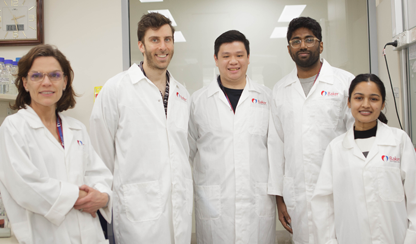
While the concept of a 'body clock' is fairly well established, one laboratory at the Baker Heart and Diabetes Institute is taking things a step further to better understand why people with heart disease have a 'cardiac clock' that's not keeping time.
Alice Baker and Eleanor Shaw Gender Equity Fellow, and Head of the Baker Institute's Cardiovascular Endocrinology laboratory, Associate Professor Morag Young is particularly interested in the cellular mechanisms behind a ticker that is out of time with the body's natural circadian rhythms.
"Circadian rhythms — commonly known as our body clock — happen across roughly 24 hours, generally dictating when we wake up and go to sleep, the release of certain hormones, and changes in metabolic processes," Professor Young says.
"Every cardiac function also follows a circadian rhythm, including things like blood pressure and our heart rhythm.
"In fact, every single cell has its own 'clock' that helps the cell or tissue anticipate increased activity in the morning, when to rest and when to be ready for a challenge."
Professor Young says issues arise when our clocks got out of time with each other.
"The light going into your eyes signals to your brain to regulate a 'central clock' to synchronise each of the clocks within our cells. However, when these cellular clocks are not coordinated with the central clock, and hence the time of day, that can set up cell stress and the start of disease processes," she says.
"This dysregulation can happen because, while the central clock is very much dictated by light, cellular clocks can be dictated by stimuli like physical activity, eating or even certain medications.
"So when we change our wake/sleep cycle due to shift work, use smart phones and computers in the normal rest period, or eat at odd hours of the night, our cellular clocks are no longer synchronised."
Associate Professor Young has long looked at the interplay between heart disease and a protein called the mineralocorticoid receptor (MR). The MR helps in adjusting sodium, potassium and blood pressure levels, and also plays a major role in vascular disease and the progression of heart failure.
Associate Professor Young's research also shows that the MR interacts with the heart's cellular clock.
"It can induce the activation of certain clock genes. If it activates them at the wrong time, that's one signal that will push the cardiac clock out of whack with the central time-keeper," she says.
"We also now know that the MR and some circadian clock proteins work hand-in-hand to control important genes in the heart. This is an area we want to look into more closely. It's a highly novel interaction that's never really been examined before."
Work from Associate Professor Young's lab will provide a new understanding of how the MR can push the clock cycle out of synch, work that will drive development of new modulators of the MR that can be safely used by patients with heart failure and other cardiovascular diseases.






